新概念英语第二册第4课
- 格式:pptx
- 大小:113.70 KB
- 文档页数:13

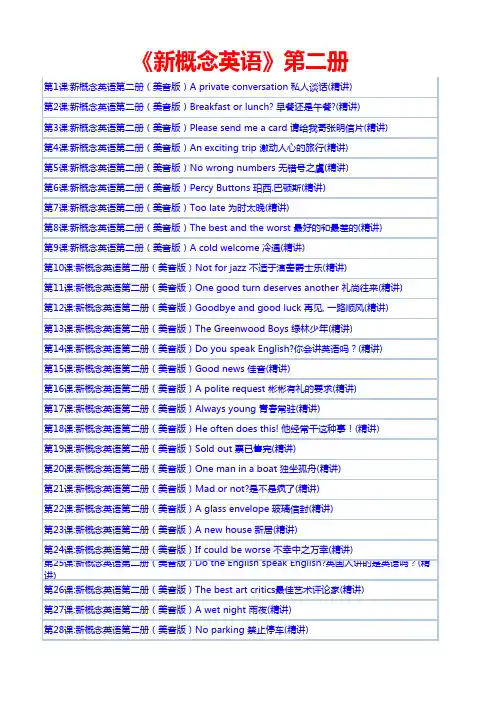
《新概念英语》第二册第1课:新概念英语第二册(美音版)A private conversation 私人谈话(精讲)第2课:新概念英语第二册(美音版)Breakfast or lunch? 早餐还是午餐?(精讲)第3课:新概念英语第二册(美音版)Please send me a card 请给我寄张明信片(精讲)第4课:新概念英语第二册(美音版)An exciting trip 激动人心的旅行(精讲)第5课:新概念英语第二册(美音版)No wrong numbers 无错号之虞(精讲)第6课:新概念英语第二册(美音版)Percy Buttons 珀西.巴顿斯(精讲)第7课:新概念英语第二册(美音版)Too late 为时太晚(精讲)第8课:新概念英语第二册(美音版)The best and the worst 最好的和最差的(精讲)第9课:新概念英语第二册(美音版)A cold welcome 冷遇(精讲)第10课:新概念英语第二册(美音版)Not for jazz 不适于演奏爵士乐(精讲)第11课:新概念英语第二册(美音版)One good turn deserves another 礼尚往来(精讲)第12课:新概念英语第二册(美音版)Goodbye and good luck 再见, 一路顺风(精讲)第13课:新概念英语第二册(美音版)The Greenwood Boys 绿林少年(精讲)第14课:新概念英语第二册(美音版)Do you speak English?你会讲英语吗?(精讲)第15课:新概念英语第二册(美音版)Good news 佳音(精讲)第16课:新概念英语第二册(美音版)A polite request 彬彬有礼的要求(精讲)第17课:新概念英语第二册(美音版)Always young 青春常驻(精讲)第18课:新概念英语第二册(美音版)He often does this! 他经常干这种事!(精讲)第19课:新概念英语第二册(美音版)Sold out 票已售完(精讲)第20课:新概念英语第二册(美音版)One man in a boat 独坐孤舟(精讲)第21课:新概念英语第二册(美音版)Mad or not?是不是疯了(精讲)第22课:新概念英语第二册(美音版)A glass envelope 玻璃信封(精讲)第23课:新概念英语第二册(美音版)A new house 新居(精讲)第24课:新概念英语第二册(美音版)If could be worse 不幸中之万幸(精讲)第25课:新概念英语第二册(美音版)Do the English speak English?英国人讲的是英语吗?(精讲)第26课:新概念英语第二册(美音版)The best art critics最佳艺术评论家(精讲)第27课:新概念英语第二册(美音版)A wet night 雨夜(精讲)第28课:新概念英语第二册(美音版)No parking 禁止停车(精讲)第29课:新概念英语第二册(美音版)Taxi! 出租汽车(精讲)第30课:新概念英语第二册(美音版)Football or polo? 足球还是水球?(精讲)第31课:新概念英语第二册(美音版)Success story 成功者的故事(精讲)第32课:新概念英语第二册(美音版)Shopping made easy 购物变得很方便(精讲)第33课:新概念英语第二册(美音版)Out of the darkness 冲出黑暗(精讲)第34课:新概念英语第二册(美音版)Quick work 破案 “神速”(精讲)第35课:新概念英语第二册(美音版)Stop thief!捉贼!(精讲)第36课:新概念英语第二册(美音版)Across the Channel 横渡海峡(精讲)第37课:新概念英语第二册(美音版)The Olympic Games 奥林匹克运动会(精讲)第38课:新概念英语第二册(美音版)Everything except the weather 唯独没有考虑到天气(精讲第39课:新概念英语第二册(美音版)Am I all right? 我是否痊愈?(精讲)第40课:新概念英语第二册(美音版)Food and talk 进餐与交谈(精讲)第41课:新概念英语第二册(美音版)Do you call that a hat? 你把那个叫帽子吗?(精讲)第42课:新概念英语第二册(美音版)Not very musical 并非很懂音乐(精讲)第43课:新概念英语第二册(美音版)Over the South Pole 飞越南极(精讲)第44课:新概念英语第二册(美音版)Through the forest 穿过森林(精讲)第45课:新概念英语第二册(美音版)A clear conscience 问心无愧(精讲)第46课:新概念英语第二册(美音版)Expensive and uncomfortable 既昂贵又受罪(精讲)第47课:新概念英语第二册(美音版)A thirsty ghost 嗜酒的鬼魂(精讲)第48课:新概念英语第二册(美音版)Did you want to tell me something? 你想对我说什么吗?第49课:新概念英语第二册(美音版)The end of a dream 美梦告终(精讲)第50课:新概念英语第二册(美音版)Taken for a ride 乘车兜风(精讲)第51课:新概念英语第二册(美音版)Reward for virtue 对美德的奖赏(精讲)第52课:新概念英语第二册(美音版)A pretty carpet 漂亮的地毯(精讲)第53课:新概念英语第二册(美音版)Hot snake 触电的蛇(精讲)第54课:新概念英语第二册(美音版)Sticky fingers 粘糊的手指(精讲)第55课:新概念英语第二册(美音版)Not a gold mine 并非金矿(精讲)第56课:新概念英语第二册(美音版)Faster than sound! 比声音还快!(讲解)第57课:新概念英语第二册(美音版)Can I help you, madam? 您要买什么,夫人?(精讲)第58课:新概念英语第二册(美音版)A blessing in disguise? 是因祸得福吗?(精讲)第59课:新概念英语第二册(美音版)In or out? 进来还是出去?(精讲)第60课:新概念英语第二册(美音版)The future 卜算未来(精讲)第61课:新概念英语第二册(美音版)Trouble with the Hubble 哈勃望远镜的困境(讲解)第62课:新概念英语第二册(美音版)After the fire 大火之后(精讲)第63课:新概念英语第二册(美音版)She was not amused 她并不觉得好笑(精讲)第64课:新概念英语第二册(美音版)The Channel Tunnel 海峡隧道(精讲)第65课:新概念英语第二册(美音版)Jumbo versus the police 小象对警察(精讲)第66课:新概念英语第二册(美音版)Sweet as honey! 像蜜一样甜!(精讲)第67课:新概念英语第二册(美音版)Volcanoes 火山(精讲)第68课:新概念英语第二册(美音版)Persistent 纠缠不休(精讲)第69课:新概念英语第二册(美音版)But not murder!并非谋杀!(精讲)第70课:新概念英语第二册(美音版)Red for danger 危险的红色(精讲)第71课:新概念英语第二册(美音版)A famous clock第72课:新概念英语第二册(美音版)A car called bluebird第73课:新概念英语第二册(美音版)The record-holder第74课:新概念英语第二册(美音版)Out of the limelight第75课:新概念英语第二册(美音版)SOS第76课:新概念英语第二册(美音版)April Fools Day第77课:新概念英语第二册(美音版)A successful operation第78课:新概念英语第二册(美音版)The last one?第79课:新概念英语第二册(美音版)By air第80课:新概念英语第二册(美音版)The Crystal Palace第81课:新概念英语第二册(美音版)Escape第82课:新概念英语第二册(美音版)Monster or fish?第83课:新概念英语第二册(美音版)After the elections第84课:新概念英语第二册(美音版)On strike第85课:新概念英语第二册(美音版)Never too old to learn第86课:新概念英语第二册(美音版)Out of control第87课:新概念英语第二册(美音版)A perfect alibi第88课:新概念英语第二册(美音版)Trapped in a mine第89课:新概念英语第二册(美音版)A slip of the tongue 第90课:新概念英语第二册(美音版)What第91课:新概念英语第二册(美音版)Three men in a basket 第92课:新概念英语第二册(美音版)Asking for trouble第93课:新概念英语第二册(美音版)A noble gift第94课:新概念英语第二册(美音版)Future champions第95课:新概念英语第二册(美音版)A fantasy第96课:新概念英语第二册(美音版)The dead return。

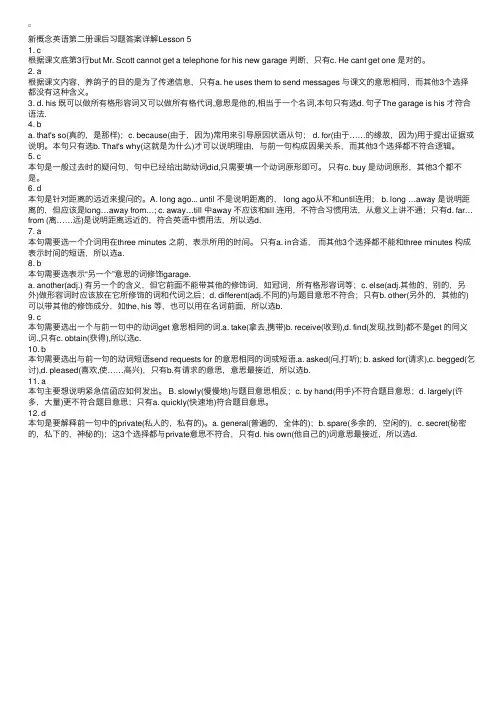
新概念英语第⼆册课后习题答案详解Lesson 51. c根据课⽂底第3⾏but Mr. Scott cannot get a telephone for his new garage 判断,只有c. He cant get one 是对的。
2. a根据课⽂内容,养鸽⼦的⽬的是为了传递信息,只有a. he uses them to send messages 与课⽂的意思相同,⽽其他3个选择都没有这种含义。
3. d. his 既可以做所有格形容词⼜可以做所有格代词,意思是他的,相当于⼀个名词,本句只有选d. 句⼦The garage is his 才符合语法.4. ba. that's so(真的,是那样);c. because(由于,因为)常⽤来引导原因状语从句; d. for(由于……的缘故,因为)⽤于提出证据或说明。
本句只有选b. That's why(这就是为什么)才可以说明理由,与前⼀句构成因果关系,⽽其他3个选择都不符合逻辑。
5. c本句是⼀般过去时的疑问句,句中已经给出助动词did,只需要填⼀个动词原形即可。
只有c. buy 是动词原形,其他3个都不是。
6. d本句是针对距离的远近来提问的。
A. long ago... until 不是说明距离的, long ago从不和until连⽤; b. long …away 是说明距离的,但应该是long…away from…; c. away…till 中away 不应该和till 连⽤,不符合习惯⽤法,从意义上讲不通;只有d. far…from (离……远)是说明距离远近的,符合英语中惯⽤法,所以选d.7. a本句需要选⼀个介词⽤在three minutes 之前,表⽰所⽤的时间。
只有a. in合适,⽽其他3个选择都不能和three minutes 构成表⽰时间的短语,所以选a.8. b本句需要选表⽰“另⼀个”意思的词修饰garage.a. another(adj.) 有另⼀个的含义,但它前⾯不能带其他的修饰词,如冠词,所有格形容词等;c. else(adj.其他的,别的,另外)做形容词时应该放在它所修饰的词和代词之后;d. different(adj.不同的)与题⽬意思不符合;只有b. other(另外的,其他的)可以带其他的修饰成分,如the, his 等,也可以⽤在名词前⾯,所以选b.9. c本句需要选出⼀个与前⼀句中的动词get 意思相同的词.a. take(拿去,携带)b. receive(收到),d. find(发现,找到)都不是get 的同义词.,只有c. obtain(获得),所以选c.10. b本句需要选出与前⼀句的动词短语send requests for 的意思相同的词或短语.a. asked(问,打听); b. asked for(请求),c. begged(乞讨),d. pleased(喜欢,使……⾼兴),只有b.有请求的意思,意思最接近,所以选b.11. a本句主要想说明紧急信函应如何发出。
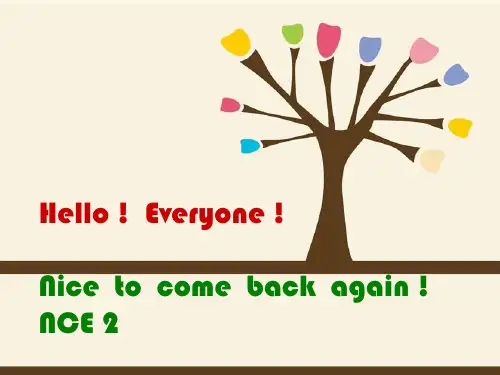
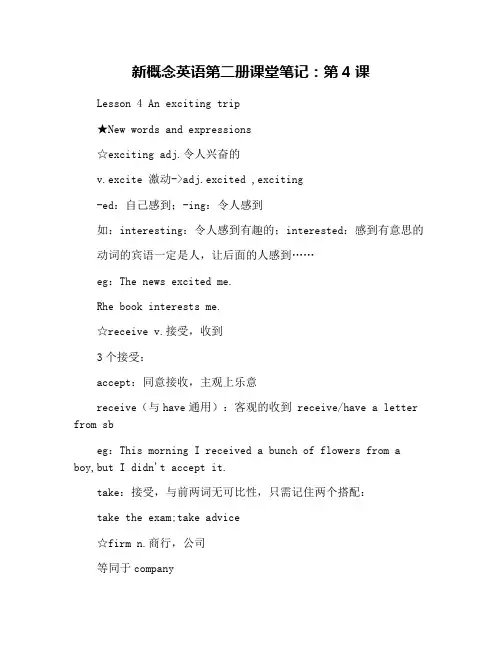
新概念英语第二册课堂笔记:第4课Lesson 4 An exciting trip★New words and expressions☆exciting adj.令人兴奋的v.excite 激动->adj.excited ,exciting-ed:自己感到;-ing:令人感到如:interesting:令人感到有趣的;interested:感到有意思的动词的宾语一定是人,让后面的人感到……eg:The news excited me.Rhe book interests me.☆receive v.接受,收到3个接受:accept:同意接收,主观上乐意receive(与have通用):客观的收到 receive/have a letter from sbeg:This morning I received a bunch of flowers from a boy,but I didn't accept it.take:接受,与前两词无可比性,只需记住两个搭配:take the exam;take advice☆firm n.商行,公司等同于company☆abroad adv.在国外注意是个副词,直接和动词连用,不需要介词go/live/study abroad★TextI have just received a letter from my brother Tim.He is in Australia.He has been there for six months.Tim is an engineer.He is working for a big firm and he has already visited a great number of different places in Australia.He ha just bought an Australian car and has gone to Alice Springs,a small town in the centre of Australia.He will soon visit Darwin.From there,he will fly to Perth.My brother has never benn abroad before,so he is finding this trip very exciting.☆have been+in 地点他已经到北京了:He has arrived in Beijing.他到北京一年了,就不能用arrive了。
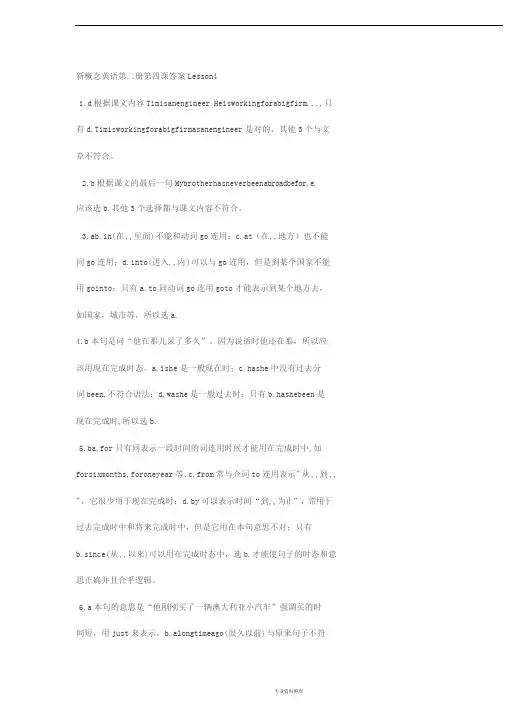
新概念英语第二册第四课答案Lesson41.d根据课文内容Timisanengineer.Heisworkingforabigfirm...,只有d.Timisworkingforabigfirmasanengineer是对的,其他3个与文章不符合。
2.b根据课文的最后一句Mybrotherhasneverbeenabroadbefor,e,应该选b.其他3个选择都与课文内容不符合。
3.ab.in(在,,里面)不能和动词go连用;c.at(在,,地方)也不能同go连用;d.into(进入,,内)可以与go连用,但是到某个国家不能用gointo;只有a.to同动词go连用goto才能表示到某个地方去,如国家,城市等,所以选a.4.b本句是问“他在那儿呆了多久”。
因为说话时他还在那,所以应该用现在完成时态。
a.ishe是一般现在时;c.hashe中没有过去分词been,不符合语法;d.washe是一般过去时;只有b.hashebeen是现在完成时,所以选b.5.ba.for只有同表示一段时间的词连用时候才能用在完成时中,如forsixmonths,foroneyear等.c.from常与介词to连用表示"从,,到,, ",它很少用于现在完成时;d.by可以表示时间“到,,为止”,常用于过去完成时中和将来完成时中,但是它用在本句意思不对;只有b.since(从,,以来)可以用在完成时态中,选b.才能使句子的时态和意思正确并且合乎逻辑。
6.a本句的意思是“他刚刚买了一辆澳大利亚小汽车”强调买的时间短,用just来表示。
b.alongtimeago(很久以前)与原来句子不符合。
styear(去年)也跟原来句子不符合。
d.sixmonthsago(6个月 前)也不对,句子中没有明确说明;只有a .a shor tt im ea (久前,最近)同just 的意思相近,所以应该选a. 7.c 本句需要用现在完成时,已经给出了助动词has,只需要填上过去分词就可以了。
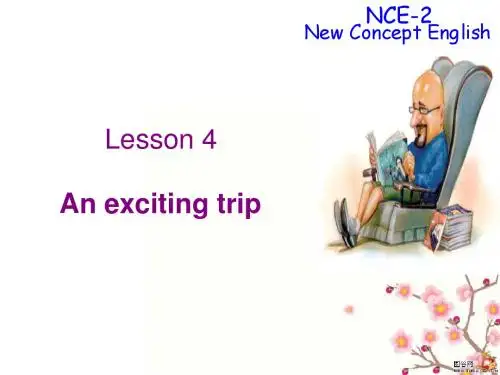
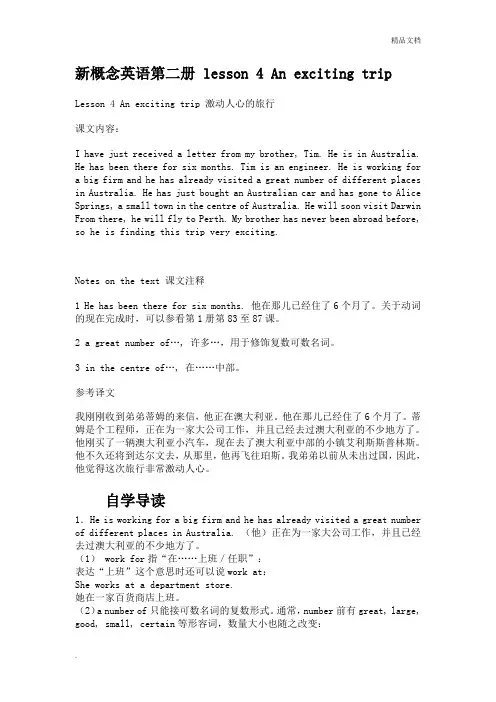
新概念英语第二册 lesson 4 An exciting trip Lesson 4 An exciting trip 激动人心的旅行课文内容:I have just received a letter from my brother, Tim. He is in Australia. He has been there for six months. Tim is an engineer. He is working for a big firm and he has already visited a great number of different places in Australia. He has just bought an Australian car and has gone to Alice Springs, a small town in the centre of Australia. He will soon visit Darwin From there, he will fly to Perth. My brother has never been abroad before, so he is finding this trip very exciting.Notes on the text 课文注释1 He has been there for six months. 他在那儿已经住了6个月了。
关于动词的现在完成时,可以参看第1册第83至87课。
2 a great number of…, 许多…,用于修饰复数可数名词。
3 in the centre of…, 在……中部。
参考译文我刚刚收到弟弟蒂姆的来信,他正在澳大利亚。
他在那儿已经住了6个月了。
蒂姆是个工程师,正在为一家大公司工作,并且已经去过澳大利亚的不少地方了。
他刚买了一辆澳大利亚小汽车,现在去了澳大利亚中部的小镇艾利斯斯普林斯。
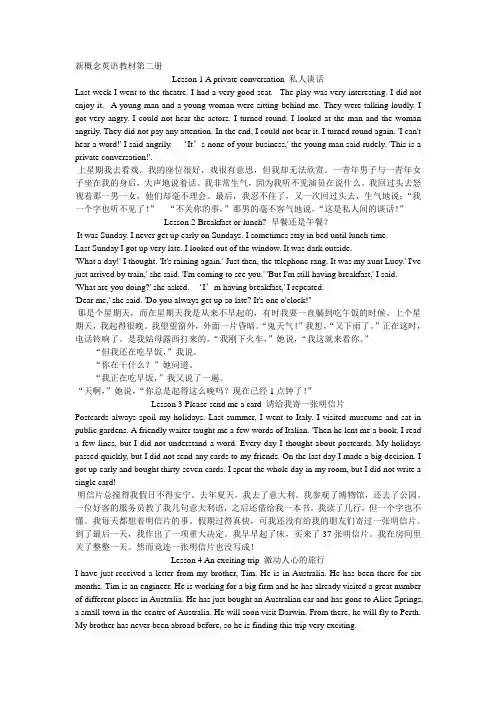
新概念英语教材第二册Lesson 1 A private conversation 私人谈话Last week I went to the theatre. I had a very good seat. The play was very interesting. I did not enjoy it. A young man and a young woman were sitting behind me. They were talking loudly. I got very angry. I could not hear the actors. I turned round. I looked at the man and the woman angrily. They did not pay any attention. In the end, I could not bear it. I turned round again. 'I can't hear a word!' I said angrily. ‘It’s none of your business,' the young man said rudely. 'This is a private conversation!'.上星期我去看戏。
我的座位很好,戏很有意思,但我却无法欣赏。
一青年男子与一青年女子坐在我的身后,大声地说着话。
我非常生气,因为我听不见演员在说什么。
我回过头去怒视着那一男一女,他们却毫不理会。
最后,我忍不住了,又一次回过头去,生气地说:“我一个字也听不见了!”“不关你的事,”那男的毫不客气地说,“这是私人间的谈话!”Lesson 2 Breakfast or lunch? 早餐还是午餐?It was Sunday. I never get up early on Sundays. I sometimes stay in bed until lunch time.Last Sunday I got up very late. I looked out of the window. It was dark outside.'What a day!' I thought. 'It's raining again.' Just then, the telephone rang. It was my aunt Lucy.' I've just arrived by train,' she said. 'I'm coming to see you.' 'But I'm still having breakfast,' I said.'What are you doing?' she asked. ‘I’m having breakfast,' I repeated.'Dear me,' she said. 'Do you always get up so late? It's one o'clock!''那是个星期天,而在星期天我是从来不早起的,有时我要一直躺到吃午饭的时候。
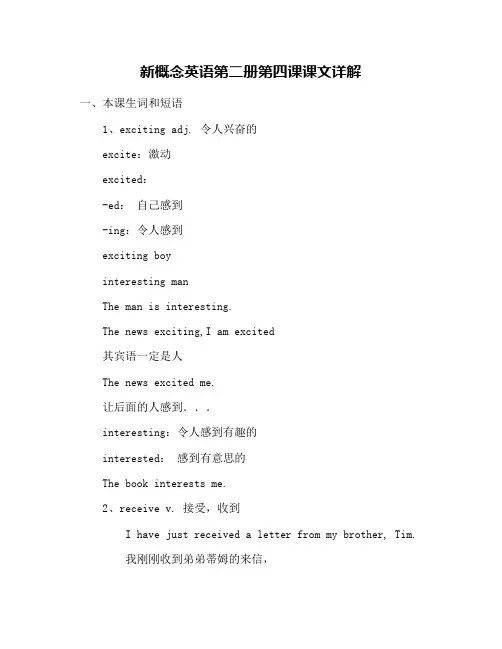
新概念英语第二册第四课课文详解一、本课生词和短语1、exciting adj. 令人兴奋的excite:激动excited:-ed:自己感到-ing:令人感到exciting boyinteresting manThe man is interesting.The news exciting,I am excited其宾语一定是人The news excited me.让后面的人感到...interesting:令人感到有趣的interested:感到有意思的The book interests me.2、receive v. 接受,收到I have just received a letter from my brother, Tim.我刚刚收到弟弟蒂姆的来信,receive[ri5si:v]vt.收到, 接到, 接收(receive的过去式和过去分词是received)re-前缀,表"又,重新"的意思。
Receive/ accept/和take的区别:accept:同意接收receive:客观的收到take take the exam:接收考试; take advice接收建议This morning I received a bunch of flowers from aboy,but I didn't acceptit.take take the exam:接收考试; take advice接收建议receive/havereceive/have a letter from somebody.3、firm n. 商行,公司Companyfirm 主要用在非正式场合和口语,Company 是公司的正式称呼。
4、abroad adv. 在国外副词,直接和动词连用go aroadlive abroadstudy abroad5、so he is finding this trip very exciting.所以,他觉得这次旅行非常激动人心。
Lesson 4 An exciting trip 激动人心的旅行New words and Expressions★1. exciting adj. 令人兴奋的excited adj. (感到)兴奋的excite v. 令某人兴奋(人做宾语)eg. The news excited us. (过去式) 令我们兴奋。
eg. I have never been to Australia. It must be an exciting trip.我从来没去过澳大利亚。
那里一定是一次激动人心的旅行。
eg. He is finding this trip very exciting.他发现旅途非常令人兴奋。
(very exciting 宾语补足语)eg. We are excited at the news. 我们对消息感到兴奋。
be excited at sth 对…感到兴奋。
eg.The excited girl is looking forward to her exciting first date with her “Mr. Right”.这个兴奋的女孩渴望着她的激动人心的和白马王子的第一次约会。
look forward 渴望,盼望 date 约会eg. The excited children were expecting Christmas presents.那些兴奋的孩子正在期待着圣诞礼物。
be expecting 期待,怀孕类似的词:surprising 令人惊奇的 surprised 感到惊奇的interesting 令人感兴趣的 interested 感到感兴趣的shocking 令人震惊的 shocked 感到震惊的satisfying 令人满意的 satisfied 感到满意的disappointing 令人失望的 disappointed 感到失望的moving 令人感动的 moved 感到感动的touching 令人感动的 touched 感到感动的embarrassing 令人难堪的 embarrassed 感到难堪的尴尬的★2. receive v. 收到receive sth from sb 从谁那收到什么东西receive a letter 收到一封信 receive a present 收到一份礼物receive a phone call 接到一个电话 receive good education 得到良好的教育eg. You will receive a warm welcome whenever you come to my home.无论你什么时候来我们家你都会得到热烈欢迎的。
Lesson 4 An exciting trip激动人心的旅行I have just received a letter from my brother, Tim. He is in Australia. He has been there for six months. Tim is an engineer. He is working for a big firm and he has already visited a great number of different places in Australia. He has just bought an Australian car and has gone to Alice Springs, a small town in the centre of Australia. He will soon visit Darwin. From there, he will fly to Perth. My brother has never been abroad before, so he is finding this trip very exciting.New words and expressions 生词和短语exciting adj. 令人兴奋的receive v. 接受,收到firm n. 商行,公司different adj. 不同的centre n. 中心abroad adv. 在国外Darwin ['dɑrwɪn]参考译文我刚刚收到弟弟蒂姆的来信,他正在澳大利亚。
他在那儿已经住了6个月了。
蒂姆是个工程师,正在一家大公司工作,并且已经去过澳大利亚的不少地方了。
他刚买了一辆澳大利亚小汽车,现在去了澳大利亚中部的小镇艾利斯斯普林斯。
他不久还将到达达尔文去,从那里,他再飞往珀斯。
我弟弟以前从未出过国,因此,他觉得这次旅行非常激动人心。
新概念英语第二册课后习题答案详解Lesson 4练习答案Key to written exercises1.关键句型练习答案A 1 I have just had breakfast.2 He has been in prison for six months.3 The police have not caught the thief yet.4 You have (already) asked that question three times (already).5 Have you ever been to Switzerland6 I have never been to Switzerland.7 He is a wonderful runner. He has broken two records so far .8 I haven't seen George lately .C 1 He has just left the house .2 He has just had breakfast .3 She has just written a letter .4 My sister has just turned on the radio .5 My mother has just made the bed .6 She has just bought a new hat.D 1 He hasn't washed the dishes yet .2 She hasn't made the beds yet .3 He hasn't combed his hair yet .4 She hasn't swept the carpet yet .5 W e haven't read ‘ Macbeth’yet .E 1 Have you seen the new play at ‘The Globe’yet2 Have you taken your holidays yet3 Have you read this book yet4 Have you done your homework yet5 Have you finished your work yet2 .难点练习答案1 received2 received3 took4 taken5 take3.多项选择题答案1. d根据课文内容Tim is an engineer. He is working for a big firm..., 只有d. Timis working for a big firm as an engineer 是对的,其他3个与文章不符合。
新概念英语2第四课原文新概念英语2第四课原文Part 1: Introduction新概念英语2第四课是一节让人们学习英文阅读理解技巧的基础课程。
这节课程所涉及的文章内容简单,注重表达方式和语言结构。
在学习这篇文章时,学生们将学会如何在英文阅读中抓住关键信息,并且掌握一些常用的词汇和语法知识。
Part 2: The Original Text以下为本课程原文:An Unknown CustomerIt was half past nine when I discovered that I had forgotten to telephone my client. I went to the phone at once, but the line was busy. I tried again and again, but it was still busy. I was getting worried because the appointment was for ten o'clock. I explained the situation to my secretary and told herthat I was going out to keep the appointment, but that I would be back in about an hour.I left my office and hurried towards the station. It was beginning to rain andI found it difficult to get a taxi. When I eventually reached the station, Ifound that the trains were not running because of a strike. I did not know what to do. If I went back to my office, it would take at least half an hour. If I walked to my client's office, I would be wet through when I got there. As there was nothing else to do, I decided to take the subway.When I got out of the subway, I realized that I did not know the way to my client's office. I had only been there once before and that was a year ago. I looked for a taxi, but there was not one in sight. I had no alternative but to walk. I was not at all sure in which direction to go, but I remembered that there was a large church near my client's office. After walking for about twenty minutes, I saw the church in the distance.I was walking quickly, but I suddenly stopped. I had left my umbrella in the subway! I hesitated for a moment and then decided to go back for it. I knew that it would not take long, and I thought that it would be foolish to get wet through if I did not have to. When I got back to the subway, I found that the umbrella had gone. I went to the lost property office and described my umbrella. The man looked in his book and then disappeared into the back of the office. He returned with a large umbrella which he handed to me. It was twice the size of mine.I left the subway again and set off in the direction of the church. I had not gone very far when the rain stopped, and the sun came out. It was a beautiful day. When I arrived at my client's office, I apologized for being late, but he told me not to worry. 'I've only just arrived myself,' he said. 'I was held up by a phone call.'Part 3: Analysis and Discussion这篇原文讲述了一个人迟到的故事。